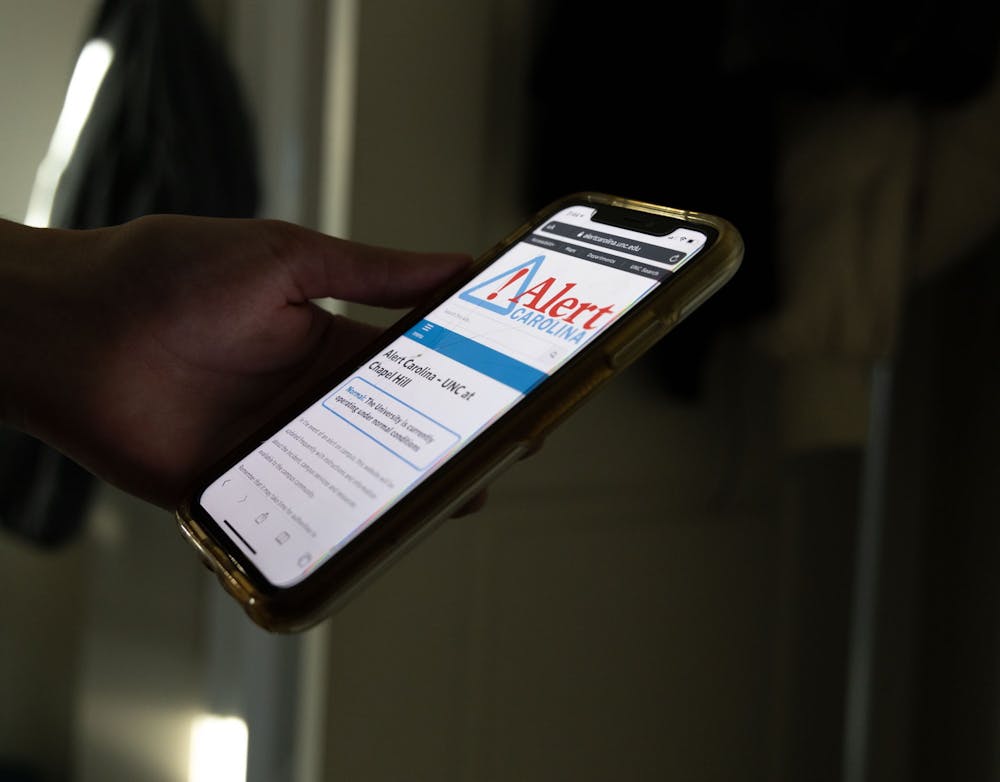Alexander Denza, a co-president with March for Our Lives UNC and a Southern Student Action Coalition organizer, said that he was scared when he saw the alert and thought of his friends on UNC’s campus.
“And seeing that message again, especially after we've seen it twice before, you know, after two lockdowns, of course, we're going to assume that it's real again,” Denza said, referring to the fatal campus shooting on Aug. 28 and the nonfatal gun incident on Sept. 13.
Denza also said that there have been lasting impacts of the gun violence on UNC’s campus, saying that when the alert was sent, many people were texting and asking if people were okay and asking was happening.
“This is something that would really traumatize anyone who has been through this experience, especially with how it was run last semester, " Denza said. “It stirs up horrible feelings.”
In an email to The Daily Tar Heel, UNC Counseling and Psychological Services wrote that it saw an increase in walk-in services provided after the shootings, but are unable to attribute a reason for the visits.
“From Aug. 29-Sept. 1, 2023, CAPS provided walk-in services to 192 students. During that same time frame in 2022, CAPS provided walk-in services to 87 students,” the email said.
Denza described the Alert Carolina system as lacking, speaking specifically about feedback that messages should display in multiple languages and that the system should update more frequently.
Denza also said that during the last lockdown, many students voiced concerns over the all clear message from Alert Carolina telling students to resume normal activities.
“There's just no possibility of resuming normal activities after going through something like this,” Denza said.
When The DTH reached out to the University for comment on the June 18 incident and to speak with members of the Emergency Management and Planning department, Media Relations wrote that the University is committed to “continuous improvement to ensure we provide timely and accurate notifications during emergencies.”
“We apologize for the confusion,” Media Relations wrote in regard to the emergency message sent June 18. “We are looking into the incident and will take steps to avoid it in the future.”
How Alert Carolina works
To get the day's news and headlines in your inbox each morning, sign up for our email newsletters.
The activation of Alert Carolina emergency warnings involves actions by campus safety officials and system operators to ensure the immediate release emergency notifications, according to the Media Relations email. The Alert Carolina website describes that sirens go off on campus in the case of emergency warnings and tests.
In its email, Media Relations said that the process to send a message begins as soon as a situation is confirmed and enough information for a message to be drafted has been gathered by UNC Police or other officials.
Media Relations also wrote that Alert Carolina messages, emails and texts to faculty and staff are created through templates, prewritten messages and fresh messages, depending on the situation. The “all clear” message that is issued when an emergency ends also occurs through a streamlined set of actions by campus safety officials and system operators.
“Most emergency update messages are written by the public information officer, who is a staff member in University Communications, in partnership with Emergency Management and Planning,” Media Relations wrote in the email. “During an emergency, these communications are coordinated within the Emergency Operations Center, which is activated during campus emergencies.”
The email also said that messages about a change in UNC’s normal operating status are written by University Communications. Media Relations also said that for other crime and informational alerts, designated officials draft messages for review before being put in the Alert Carolina system.
@a_nanyabusiness
@dailytarheel| university@dailytarheel.com
Ananya CoxAnanya Cox is the 2024-25 University editor. She previously served as the summer University editor and a senior writer on the Udesk.




